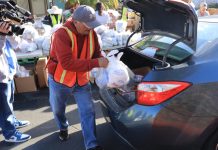The San Diego County Water Authority approved a permanent Special Agricultural Water Rate program late last year but did not include any criteria. On September 24 the SDCWA approved an ordinance adopting the program and setting eligibility criteria.
The CWA action establishes the Permanent Special Agricultural Water Rate (PSAWR) program effective January 1, 2021, and grants existing Transitional Special Agricultural Water Rate (TSAWR) program customers eligibility to participate in the PSAWR program on a temporary basis through June 30, 2021, which will allow member agencies sufficient time to verify compliance with the new PSAWR program’s eligibility requirements.
“I think it’s important for our community,” said Rainbow Municipal Water District general manager Tom Kennedy, who is Rainbow’s representative on the CWA board.
“It just codified a few things,” said Frank Hilliker, who is on the board of the Lakeside Water District and is that district’s representative on the CWA board.
In 1994 the Metropolitan Water District of Southern California (MWD) implemented the Interim Agricultural Water Program (IAWP) which provided surplus supplies to agricultural customers at a discounted rate with the condition of cutbacks in a drought of up to 30 percent prior to implementing any mandatory reductions to municipal and industrial customers. An agricultural user could choose to pay municipal and industrial (M&I) rates and not be subject to the cutbacks.
In October 2008 the MWD board voted to phase out the IAWP over a four-year period. In December 2008 the CWA board created the TSAWR program for farmers who chose to opt out of the IAWP. TSAWR customers are not eligible to receive certain water from CWA augmented supply programs. The initial TSAWR was for a two-year period although in March 2010 the CWA board voted to extend the program to the end of 2012, have a revised program for 2013 through 2015, and review that program prior to the beginning of 2016. In April 2012 the CWA board voted to extend the TSAWR until the end of 2014.
In May 2013 the CWA convened the Fiscal Sustainability Task Force whose purpose was to provide a revised rate structure intended to avoid a situation where conservation results in increased water rates due to reduced revenue from water purchases by member agencies. The task force’s report was released to member agencies in January 2014 for their input and was first brought to the CWA board as an information item in February 2014. The board expressed a preference to defer action until outstanding issues could be addressed. The desire to include the TSAWR as part of the changes resulting from the task force recommendations led to a one-year extension of that program in June 2014 when the CWA’s 2014-15 budget was approved. In March 2015 the CWA board approved several of the task force’s recommendations and extended the TSAWR until the end of 2020.
The Fiscal Sustainability Task Force was reconvened in July 2019. Hilliker chairs that task force. Valley Center Municipal Water District general manager Gary Arant is the vice-chair of the task force which also includes Carlos Lugo of the Helix Water District, Kimberly Thorner of the Olivenhain Water District, Mark Watton of the Otay Water District, Doug Wilson of the Padre Dam Municipal Water District, City of San Diego representatives Chris Cate and Matt Vespi, and Mike Hogan of the Santa Fe Irrigation District. Although the task force is addressing other subjects, the TSAWR was the focus of multiple meetings.
An October 2019 task force meeting included a presentation from the CWA’s cost of service consultant. The task force recommended that the TSAWR be made permanent, and the CWA’s Administrative and Finance Committee also made such a recommendation prior to the full board vote. Hilliker also chairs the Administrative and Finance Committee.
Hilliker and other family members own the egg ranch his grandfather founded in 1942; that ranch utilizes well water and was not involved in the TSAWR program or its predecessor. Hilliker is also a past president of the Lakeside Chamber of Commerce.
A unanimous CWA board vote in November 2019 approved making the SAWR permanent. That approval was for the framework only; the specific rates will be part of the budget process.
“It’s permanent. People don’t have to annually renew,” Hilliker said. “Now instead of making it special we made it permanent.”
PSAWR customers will pay the MWD Tier 1 untreated supply rate, the melded treatment rate, the transportation rate, the Customer Service Charge which is intended to recover costs which support the operations of the CWA, and the Infrastructure Access Charge which is used for CWA fixed expenditures incurred even when water use is reduced and is per meter equivalent rather than based on usage volume. PSAWR customers will not pay the melded supply rate which reflects water purchased from the Imperial Irrigation District (IID) under the Quantification Settlement Agreement (QSA) and water produced by the Claude “Bud” Lewis Carlsbad Desalination Plant as well as water delivered from MWD, the Storage Charge which recovers costs related to emergency storage programs, the Supply Reliability Charge, or other charges related to regional conveyance.
The plan when the SAWR was made permanent in November 2019 was for the CWA to develop and finalize new program guidelines during the first half of Calendar Year 2020 and to initiate new sign-ups during the second half of 2020. The November 2019 approval also called for an evaluation of the program every five years to review current (at the time) and forecasted demands and supplies.
The June 2020 CWA meeting adopted the Calendar Year 2021 rates and charges, and the PSAWR was included. Future rates will continue to reflect cost of service standards and will be determined annually as part of the annual rate setting process.
The directive for CWA staff to develop the program guidelines included interaction with member agencies and other stakeholders. Member agency workshops were conducted on April 28 and August 24.
The eligibility criteria for the PSAWR program requires that customers grow or raise for commercial purposes products of an agricultural, horticultural, or floricultural nature. To verify that eligibility, CWA member agencies will be required to confirm that customers are included on one of four lists: the Regional Water Quality Control Board’s General Agricultural Orders Enrollment List, the county’s Growers List, the county’s Active Certified Producers List, or the county’s Organic Producers List.
“If you’re not on one of those lists you’re ineligible,” Kennedy said. “They’re either going to have to get on a list or we’re going to have to drop them from the program.”
Participation in the PSAWR is voluntary. Although the TSAWR was limited to former IAWP customers, farmers who were not in the TSAWR will be eligible for the PSAWR.
“This program will help more farmers,” Hilliker said. “It’s good that we could do that.”













